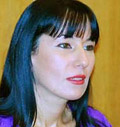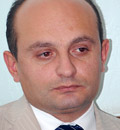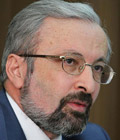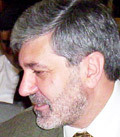Few people in Armenia were interested in the elections of the European parliament on June 4-7. Even a lot of politicians either did not know anything about it or were not interested in it so much. However it is interesting to know what different political powers in Armenia think about the elections of the European Parliament, and what they think about its possible influence on the EU’s European Policy project which concerns Armenia directly as well.
 Naira Zohrabyan, head of the NA standing commission on Euro-Integration affairs: “The total passive approach to the European Parliament elections brought up a new term called as mark of non-participation, which, for example, reached 57% in France. The situation was almost the same in the other countries as well. What did the EU elections show? Since the elections of 2004 the tendency of alienation from politics is growing in the EU. If we define the total picture of the European Parliament elections in a phrase it will look like the following: the social democratic powers lost, but the right conservative powers won. This means that in fact the proportion of political powers in the European Parliament will not change significantly. As for the possible influence on the Neighborhood Policy, I believe there will be no change in the strategy since the EU’s policy in the region is specific and decided, thus it does not depend on the people represented in the parliament. Accordingly it is clear that the EU policy in our region will become more active. Thus I believe that both the Neighborhood Policy and the Eastern partnership Project, which contemplates significant development of the relations between the EU and our region, will not change anything in the strategy.”
Naira Zohrabyan, head of the NA standing commission on Euro-Integration affairs: “The total passive approach to the European Parliament elections brought up a new term called as mark of non-participation, which, for example, reached 57% in France. The situation was almost the same in the other countries as well. What did the EU elections show? Since the elections of 2004 the tendency of alienation from politics is growing in the EU. If we define the total picture of the European Parliament elections in a phrase it will look like the following: the social democratic powers lost, but the right conservative powers won. This means that in fact the proportion of political powers in the European Parliament will not change significantly. As for the possible influence on the Neighborhood Policy, I believe there will be no change in the strategy since the EU’s policy in the region is specific and decided, thus it does not depend on the people represented in the parliament. Accordingly it is clear that the EU policy in our region will become more active. Thus I believe that both the Neighborhood Policy and the Eastern partnership Project, which contemplates significant development of the relations between the EU and our region, will not change anything in the strategy.”
 Stepan Safaryan, NA Heritage faction MP: “The results of such elections, in big power centers such as the US and EU, as a rule don’t change the EU’s foreign policy so much.
Stepan Safaryan, NA Heritage faction MP: “The results of such elections, in big power centers such as the US and EU, as a rule don’t change the EU’s foreign policy so much.
Because EU’s structure is rather strong and the adopted documents and projects such as the neighborhood policy and eastern partnership project will be implemented without significant change.
The problem is that how active and effectively it will be implemented depending on the dominance of political powers there.”
 Tigran Torosyan, member of the NA standing committee on Euro-integration affairs, independent MP: “In order to estimate the affect of the European Parliament elections on the political life of the EU we should take into consideration several factors. First, the influence of the European parliament on the political life is rather weak because the decisions of this institution primarily have advisory significance. It is also easy to notice that the opinions of the European Parliament factions differ not with radical approaches but with small details concerning such issues. Furthermore, they are making efforts even to fight the differences concerning a specific issue such as the salaries of MPs. The salaries of MPs used to be defined by their countries but now the salaries are equal. In such conditions it becomes clear that we should not expect any drastic changes in the policy as a result of the elections. Even it is hard to remember when this has happened in the past.”
Tigran Torosyan, member of the NA standing committee on Euro-integration affairs, independent MP: “In order to estimate the affect of the European Parliament elections on the political life of the EU we should take into consideration several factors. First, the influence of the European parliament on the political life is rather weak because the decisions of this institution primarily have advisory significance. It is also easy to notice that the opinions of the European Parliament factions differ not with radical approaches but with small details concerning such issues. Furthermore, they are making efforts even to fight the differences concerning a specific issue such as the salaries of MPs. The salaries of MPs used to be defined by their countries but now the salaries are equal. In such conditions it becomes clear that we should not expect any drastic changes in the policy as a result of the elections. Even it is hard to remember when this has happened in the past.”
Certainly the new elections will not change anything in the neighborhood policy either. It is also worth mentioning that there are no initiatives to change anything in this direction and most part of this project has already been implemented. Even more, the EU is enlarging the scope of such projects and has launched the Eastern Partnership project to promote more opportunities for the countries covered.
 Hovhannes Igityan, representative of the Armenian National Congress: “I would not connect the European Parliament elections with the Neighborhood Policy directly. Generally if we have a closer look at the recent elections we will see that the general policy is changing. Certain nationalistic powers received more votes in other countries and the vice versa. This process should not be linked with Armenia because the EU is looking for the formula which will enable the work be more effective. The absence of the constitution, which failed to be adopted as a result of arguments on part of some countries, is an obstacle for the EU to establish a ground enabling it to exist as a “confederation”. This is a process, which I think is not connected with the Eastern Partnership or Neighborhood Policy. The Eastern partnership project is based on the policies and principles that the EU has already shown and reflected. It involves six partner countries, each of which should make an independent decision whether this project fits with their interests and how it does. The effective fulfillment of this project in our country depends on our government. Are they honest when they say that they are building our country in compliance with the EU standards?”
Hovhannes Igityan, representative of the Armenian National Congress: “I would not connect the European Parliament elections with the Neighborhood Policy directly. Generally if we have a closer look at the recent elections we will see that the general policy is changing. Certain nationalistic powers received more votes in other countries and the vice versa. This process should not be linked with Armenia because the EU is looking for the formula which will enable the work be more effective. The absence of the constitution, which failed to be adopted as a result of arguments on part of some countries, is an obstacle for the EU to establish a ground enabling it to exist as a “confederation”. This is a process, which I think is not connected with the Eastern Partnership or Neighborhood Policy. The Eastern partnership project is based on the policies and principles that the EU has already shown and reflected. It involves six partner countries, each of which should make an independent decision whether this project fits with their interests and how it does. The effective fulfillment of this project in our country depends on our government. Are they honest when they say that they are building our country in compliance with the EU standards?”
This supplement has been produced with the assistance of the European Union. The content of this supplement is the sole responsibility of “168 Hours” Newspaper and can in no way be taken to reflect the views of the European Union
